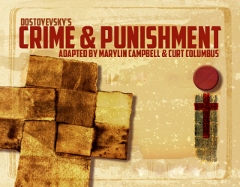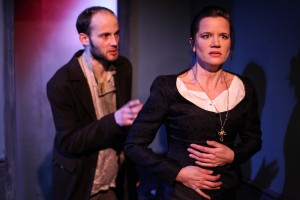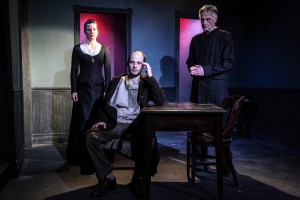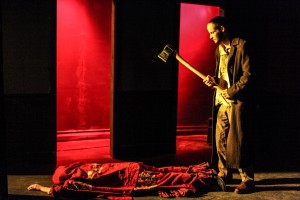PLAYING GOD AIN’T FOR AMATEURS
Following his return from a decade in exile in Siberia as a dissenter against the Romanov order, Fyodor Dostoevsky intended his second novel, written as much to pay off gambling debts as to share a story, to be called The Drunkards. It would depict how alcohol destroys a family from the inside out. But slowly the pen of this playful polemicist took a different course: Dosteovsky now wants to flesh out a theory into fiction. Before it was published in 1866, the character of Rodion Romanovich Raskolnikov had taken over what would become Crime and Punishment (1866), here dramatized in a Mary-Arrchie Theatre three-person adaptation by Marilyn Cambell and Curt Columbus created for Writers Theatre in 2003. Further fleshed out by director Richard Cotovsky, the play employs flashbacks of an interrogation both to recreate a crime and to chronicle a murderer’s evolution from hubris to regret.
Unfortunately, the production doesn’t quite detonate: Dostoevsky’s monster mash — guilt triggering suffering, remorse inspiring a confession, forgiveness yielding redemption — is thwarted by too many holes in the acting, which destroy the dynamics and retard the action.
Still, Raskolnikov (R) endures as a kind of literary experiment to imagine what kind of person would happen if God was dead and all things were possible. This character definitely anticipates the twisted lovers Leopold and Loeb, the self-declared “supermen” who imagined themselves above the law as they attempted the “perfect crime” by murdering Bobby Franks. Likewise, R: Gifted with a perverse sense of entitlement, this poor St. Petersburg student and would-be lawyer contemplates his own flawless felony: He will kill a venal pawnbroker who lives exactly 730 steps from his cold and crummy flat, an old lady named Alonya whose loss would be a gain to the world. (He ends up killing her sister too, who’s in the proverbial “wrong place at the wrong time.”)
R reasons that Alonya’s stolen money will be used for better causes than she saved it for, thus balancing utility and beneficence against a cold-blooded crime. (Except that R, improvising badly, buries the money and botches his intentions.) The homicide will also define R forever, determining how natural it is to take a life when, like Napoleon (R’s moral model), you consider yourself a “man of destiny.” All great leaders are criminals; R knows he’s great; therefore R must commit a crime. Always the question persists: “If you could get universal peace (or fill in the blank) and one life stood in the way, would it be right to sacrifice that soul?”
But there’s a huge difference between an abstract accomplishment and the dirty stuff of an ugly deed. And, of course, murder will out, as E.A. Poe had shown: An “imp of the perverse” can force bad men to tell tales.
But this telling doesn’t quite come off, however convincing John Holt’s battered set with its occasional expressionistic touch of menace (it’s unclear if the theater is intentionally made as cold as R’s flat, but it is frigid). No question, Ed Porter works overtime to create a haunted and driven Raskolnikov. We’re never in doubt that the extremes that define him are the only choices he mistakenly thought he had. His gaunt face and frantic form perfectly convey both a desperate student’s “lean and hungry look” and the isolation that breeds his deadly fantasies; his Lazarus-like return from the dead is at best a bittersweet valedictory.
Less successful is Maureen Yasko, warm enough as the prostitute Sonia who becomes R’s good angel, less so as the crone of a victim who seems to ask for the axe. Most problematic is Jack McCabe’s tentative portrayal of Porfiry, the seemingly incompetent, Columbo-like detective who offers R a second chance for reasons we can only guess at; he lacks the moral weight to counter R’s delusions with Porfiry’s own grounded morality. In addition, McCabe’s depiction of Sonia’s drunken dad is forced and incoherent.
Still Mary-Arrchie’s offering is the only Crime and Punishment in town: It may take more than the 11 years since the last one before the next arrives. So, lovers of the novel and the author, who are quite correct in their adoration, may pay a pilgrimage to Angel Island if they wish.
photos by Emily Schwartz
Crime and Punishment
Mary-Arrchie Theatre Co.
Angel Island, 731 W. Sheridan Ave.
ends on March 16, 2014
for tickets, call (773) 871-0442 or visit Mary Arrchie
for more shows, visit Theatre in Chicago





